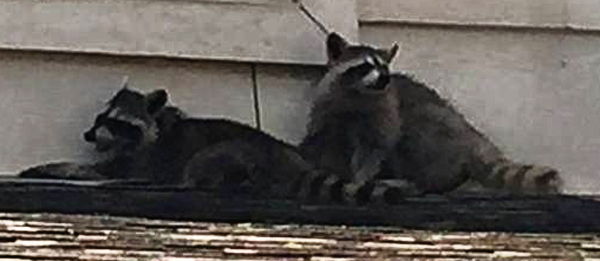- info@wildlifeanimalcontrol.com
Call us for help in your town
Wildlife Control Education
What types of diseases do raccoons carry?
Raccoons are susceptible to a number of diseases, and can carry several others without expressing symptoms. Common sense and standard preventive measures should be practiced whenever dealing with raccoons, their habitats, and especially their wastes. Rabies is the most well-known disease carried by raccoons. Raccoons infected with rabies will exhibit the following symptoms:
- disorientation
- walking in circles
- staggering or stumbling
- lethargy
- overly aggressive, or overly friendly behavior
- foaming at the mouth
- sensitivity to light and sound
- dragging/paralyzed hind legs

Rabies is a disease which affects animals and pets more often than humans. Even if a raccoon does not show symptoms, they can still carry the virus and transmit it, so please exercise caution around raccoons, and take care not to be bitten. Keep pets and small children away from raccoons.
Another disease whose symptoms are not unlike rabies is Canine Distemper (or CDV). This disease, caused by an RNA virus, manifests itself similarly to rabies, which often leads to the two being confused. However, CDV differs in that it can express nasal symptoms; nasal discharge and overgrowth/hardness of skin on the nose are big indicators of the virus. Other symptoms include vomiting, diarrhea, coughing or labored breathing, high fever, etc.
Domestic dogs are at the biggest risk for CDV. The virus is highly contagious and can be contracted in a number of ways, from inhalation to contact with contaminated food or infected bodily fluids. The fatality rate for dogs infected with CDV is about 50%, and even higher in puppies, elders, and dogs with weakened immune systems.
The second most-common syndrome transmitted by raccoons, after rabies, is raccoon roundworm, which is an infectious parasite that poses a much larger threat to humans. Raccoon roundworm eggs are present in raccoon fecal matter and can become airborne, which humans can inhale if not wearing protective breathing gear. Raccoon roundworm can cause permanent brain damage and death in humans. If you have raccoons nesting in your attic or other parts of your home, contact a raccoon removal expert. Never handle raccoon waste yourself!
Other diseases that can be contracted from raccoons include Giardia lamblia, Trypanosoma cruzi, Rickettsia rickettsii, Leptospirosis Leptospirosis, Listeriosis, Tularemia, tetanus, and salmonella. While not as fatal, most of these microorganisms still should be considered dangerous, causing a range of symptoms including heart failure.
Another condition which can be contracted from raccoons is worth noting, though the condition is not caused by a disease. Coonhound Paralysis can occur in dogs whenever they come into contact with raccoon saliva, which contains a protein that dogs' immune systems try to fight off by overcompensating. Though not fatal, Coonhound Paralysis results in severe, semi-permanent stiffening of the dog's limbs and body. Once a dog has contracted the condition, there are few treatment options available, save for keeping the dog comfortable and pain free until the condition fades, usually within a month.
These are just a small number of diseases and conditions that raccoons can transmit. Caution should always be taken when dealing with or handling raccoons, and when possible, it’s a matter best left to experts who know what they're doing.
Go back to the How to get rid of raccoons home page.
Need raccoon removal in your hometown? We service over 500 USA locations! Click here to hire us in your town and check prices - updated for year 2020.
Hi - I read your web pages and could not find an answer to my question about preventing raccoons from using my backyard as a latrine. I have a ficus tree in the yard with roots raised above the ground line. On each side, the raised roots form a bowl. The raccoons are using those areas as a community latrine. I've removed the feces once and put out jars of ammonia, but they knocked the ammonia over and started using the same area again. Is there anything else that will distract them? Thank you, Elyse
Very interesting! How many raccoons? What is the main thing you don't like about the raccoon latrine?
Hi David - I think there are 6 raccoons total. There seem to be 2 families of 3 each. The latrine smells. It is very unpleasant to look at when I'm in the yard. I also understand that raccoon feces can be a health hazard because they have worms. I know that the raccoons are just doing what comes naturally. I don't want to have them trapped (let alone killed). I just want them to choose a different bathroom. Thank you for the quick reply -- it is most appreciated! Elyse
Hmm, tough case. Is there any way to screen off those tree roots? Staple wire mesh around the perimeter of the roots?
That is an idea worth trying. Maybe use the flexible screen I use to keep birds from eating the fruit off my trees and hold it down with u-shaped 'staples ' One friend suggested I sprinkle black pepper or chili flakes which might also help - maybe sprinkle on top of the mesh screen. Hopefully they won't select another area in my yard as a substitute. I will keep you posted! Thank you. Elyse

















